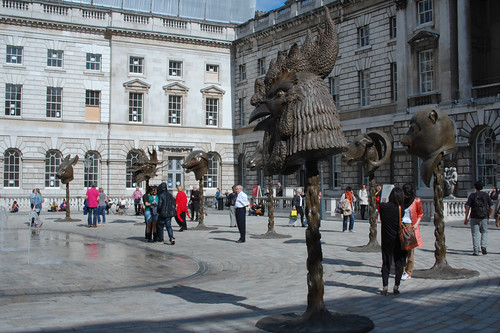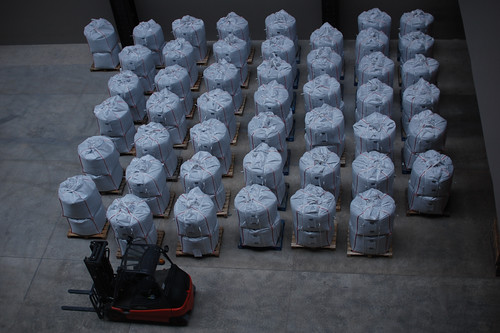The other day, an explosive thunderstorm hit London. I saw lightning for the first time since moving here. Rain pelted from clouds that were driven across the sky by a powerful storm. One minute the sky was blue and innocent, the next it was black and ferocious. It went back and forth throughout the afternoon.
A few hapless trees were uprooted, but overall the effect on the city was beneficial. The air was washed clean; pollen and dust were gone. The parks, deprived of water after the driest spring in a century, were eager to soak up the moisture. Front- and backyards appreciated the downpour as well, though there aren't that many of them. Most space adjoining houses is radically paved over. There is not much green outside designated parks, and nothing for the water to go but the sewers.
This is a big problem. Like most infrastructure in London, the sewage system is proverbially English: cute-looking in an industrial-heritage-museum kind of way but far from meeting the demands of the present. Built for a slow-moving city of three million, it must now handle the waste of seven million, each of whom statistically ingests over 3000 calories a day and drinks half a pint a night. Just like the underground, the sewage system works beyond capacity. On a good day, it does so in an English way: dutifully and without much grumbling.
When a storm goes down over London and dark clouds unload torrents, the situation changes. As such a large proportion of the ground is sealed with concrete, there's nowhere for the water to go but the sewers that are already bulging. To keep them from exploding in residential neighborhoods, Thames Water, the local utility, opens so-called combined sewer overflows (CSOs) and discharges hectoliters of untreated sewage straight into the river. This happens approximately 50 times a year. The most recent storm caused, according to Thames Water, 130,000 tons of dilute fecal matter to enter the river in my borough alone.
You would imagine that people are up in arms about this. After all, people are always up in arms about something, especially those with properties by the water. On this issue, curiously, they focus their energies elsewhere. While Thames Water is promoting an audacious £4b plan to build the Tideway Tunnel, a massive upgrade to the Victorian sewer system that would reliably take care of fecal overflow, a mob of angry residents don't see farther than their neighborhood park where they don't want construction. (*)
How can the temporary blight of a park that's used by hundreds stand up to a permanent condition afflicting millions? How can a gang of narrow-minded locals suffering from delusions of grandeur impose their parochialism on society? As the Total Perspective Vortex isn't available to give them a sense of proportion, the next best thing is a competing interest group, equally vociferous. I'm not kidding you, this oligocentric nimbyism riles me so much that I'm tempted to form a Don't shit in my river pressure group to antagonize them and restore some balance and sense.
It might be a vain fight. In my borough, the concerned residents are whipped on by the local government that starts a new reactionary petition whenever existing plans are modified to deal with residents' concerns. It's pathetic, counterproductive and a huge waste of money.
The council points out that the Thames is a pretty clean river. This is true, and it wasn't always so. On Sunday I went to the Wellcome Collection for their latest exhibition, Dirt, which charts the attitudes towards cleanliness and dirt from obsessed Holland of the 1700 through England and Germany to the current misery of Indian streetside loos. Like every Wellcome exhibition, this one was fascinating and edifying and managed to be tasteful despite the grim subject matter.
One of the rooms focused on London's sewers. I learned that the biggest deterioration of Thames water quality didn't come about when the industrial revolution got into full swing. Instead, the rapid urbanization that went along with it and the collateral population growth of London put a massive strain on the town's old sewer system. In 1815, an engineer came up with a simple solution: Just let everything empty straight into the river.
So much filth started flowing into the Thames that Parliament considered moving upriver one particularly stinky summer, the infamous Big Stink of 1858. Those plans were abandoned. Instead, the sewer system that's still serving the capital today was built, with collection and treatment facilities, and water quality slowly improved. These days, the Thames is clean enough for sea horses to gallop in the estuary and the occasional whale to cruise the waters.
Nevertheless, the fact that raw sewage regularly flows into the Thames can't be without consequences. Rowers regularly encounter turds and breathe the smell that once almost uprooted Parliament. A recent report demonstrates that WHO guidelines for the quality of recreationally used waterways are frequently breached in London and that there is "evidence of an elevated risk to the health of recreational users of the upper tideway for 2 - 4 days after CSO discharge events." Enough of this shit already, I say.
(*) It would of course be a better solution, cheaper and much better looking at the same time, to require homeowners to put lawns into their yards to break up the near universal sealing of soil (if that's the technical term?). But can you imagine the opposition to that?





